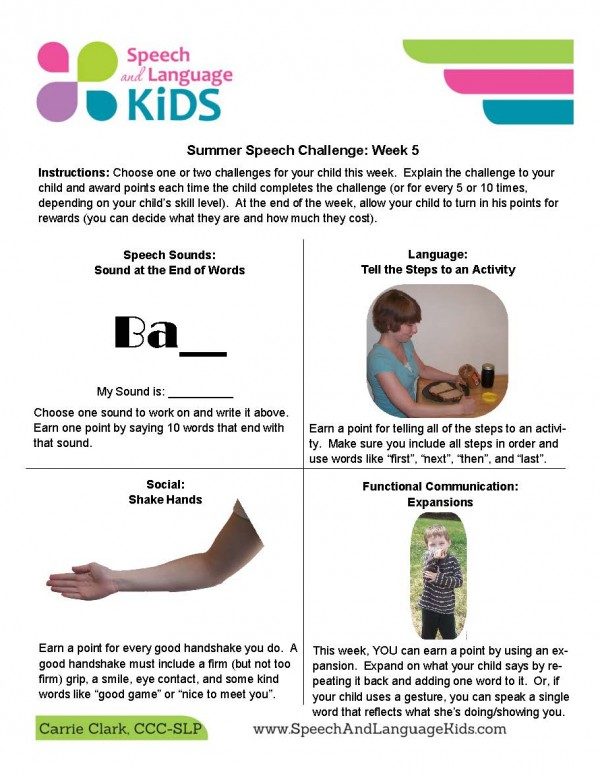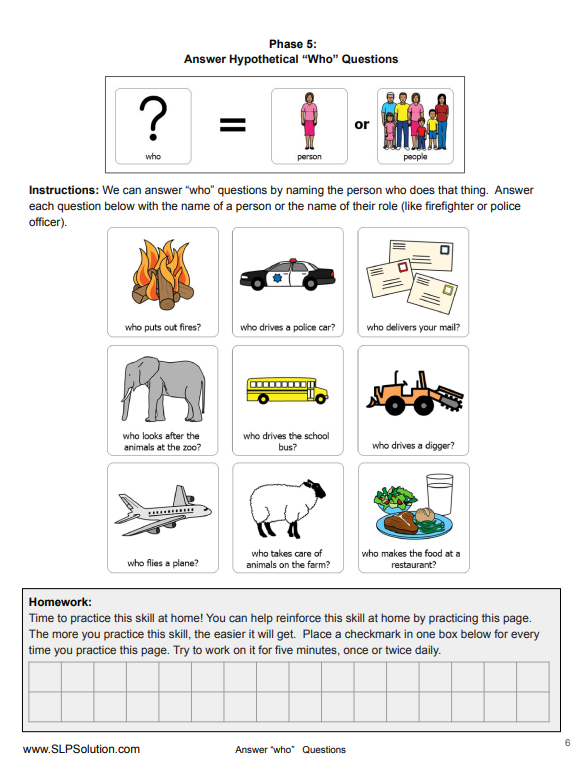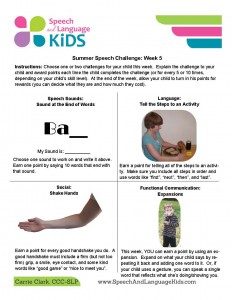Summer Speech Therapy Homework – Week 5
Welcome to week five of our Summer Speech Challenge for Parents! Click here if you want to go back and start from week 1!
Summer Speech Therapy Homework Challenge:
To recap, our Summer Speech Challenge is a new challenge for your child each week of this summer. These are simple activities that are meant for you to be able to work into your daily routines. There are four different challenges each week so you can pick which one is best for your child. If you feel like your child struggled with last week’s and you’d like to try it for another week, go for it! Or, you can push ahead and do this week’s activity anyway. Sometimes our children do better if we switch to something else.
Avoid the Battle:
I want to make a quick note here that nothing we’re doing here should be a battle! If your child is struggling to do the skill that you’ve selected, try to either make it easier or switch to something else. The reason that we speech-language pathologists go to school for 5+ years is so that we can know exactly how to tweak things when the child isn’t getting it. So don’t feel bad if it’s just not clicking for you and your child! Switch to something a little easier to keep the momentum going and check in with your child’s speech-language pathologist. This shouldn’t replace the advice of a licensed speech-language pathologist!
Choose an Area:
You’ll want to pick one or two challenges for your child to work on this week. Here’s a quick breakdown of the 4 areas that are included in our summer challenge so you can pick which skills your child needs.
- Speech Sounds: Choose this area if your child is struggling to say a sound correctly in conversation. You’ll only choose one sound to work on at a time so don’t go crazy! You can always come back and repeat this process with another sound later.
- Language: Choose this area if your child struggles with any parts of language. This can include anything from using full, grammatically-correct sentences to knowing the names for different vocabulary words. If it has to do with putting together sentences and getting your ideas across using words, then language is your area.
- Social Skills: Choose this area if your child needs help with interacting appropriately with others. We’ll practice a variety of interaction skills with this area.
- Functional Communication: Choose this area if your child is just beginning to talk or is only saying 1-2 words at a time. This area will focus on basic communication skills for our non-verbal children and new talkers.
Challenge Week 5:
Let’s get started with this week’s challenge!
Instructions:
- Choose one (or max two) areas below that your child needs to work on
- Print out the visuals for the challenges and cut out the ones your child needs
- Post the visuals somewhere so you and your child will see it frequently
- Read the challenge rules and explain it to your child in language she will understand
- Award points as your child completes the challenge throughout the week (view week 1 for ideas for this)
- Allow your child to redeem points as you see fit
Week 5 Picture Download:
Click Here to Download the PDF
The Challenges:
Speech Sounds: Sound at the Ends of Words
For the speech summer challenges, you’ll want to choose one sound to work on. It gets complicated when you start adding in multiple sounds so just choose one that your child needs to work on. It can be one he’s already been working on in speech or an entirely new one.
Last week, your child practiced saying his target sound at the beginning of words. This week, we’re going to switch and practice some words that end with the target sound. It’s OK if your child wasn’t totally perfect at the ones at the beginning of the words. Some children find it easier to do the ones at the ends.
For this week’s challenge, allow your child to earn a point by saying a word that ends with his target sound. For example, if the sound is /g/, then he could say “bug” or “rag”. If your child is really good at this, you may want to switch to one point for every 5 or 10 words.
At the beginning, you may have to say them for your child and have him repeat them back. Once he gets a little better, see if he can say them on his own. He can either think of the word on his own or you can show him a picture of a word that ends with the sound (Google image search is very helpful for this, but keep safe search on!).
Why This Helps: Your child needs a lot of practice saying this sound in different positions of words. He’s not yet ready to say the sound correctly all of the time in conversation, but he should be getting better at saying it in single words.
Language: Tell the Steps to an Activity
This week, your child can earn a challenge point by telling you all of the steps to an activity. For example, if you asked your child to tell you all of the steps to brushing her teeth, she should say something like “First I put the toothpaste on my toothbrush. Then, I put the toothbrush in my mouth and brush all of my teeth. Next, I turn on the water and rinse my toothbrush. Last, I put my toothbrush and toothpaste away.” Or something along those lines.
The goal is for your child to include all of the steps in order and to include temporal words like “first, next, then, & last”. Have your child give it a try by herself first, then help her go back and correct a few things that were wrong. If the steps were in the wrong order, ask her questions to help her realize the correct order (like, “Do you really rinse your toothbrush off before you put the toothpaste on?”). If your child is really struggling, it sometimes helps to act out those activities. Or, if your child forgot temporal words, prompt her to use “first, next, and last” when doing the sequence.
If you can, have your child go back and tell it again with those corrections made. If your child had a really hard time with this, just try to correct one thing on the re-telling. And then, when she tries the next time, try to remind her about that thing you practiced ahead of time. For example, you could say “Tell me all of the steps to brushing your teeth, and don’t forget to use ‘first, next, and last'”. I also suggest practicing the same sequence (like brushing your teeth) multiple times so the child has a chance to get better at it over time.
Why This Helps: When our children tell us (or someone else) about past events, it is very important that they are able to include the details in the correct order. This is what helps someone else follow their train of thought. Helping a child learn to tell steps in order is crucial for good story-telling and basic conversational skills.
Social Skills: Shake Hands with Proper Eye Contact
Shaking hands is a skill that comes into play more with adults than children, but it is a good skill to practice early as it WILL come up! This week, your child can earn a challenge point for each good hand shake that he has with someone else. Tell your child up front that a good hand shake includes a firm (but not too firm) grip, a smile, and eye contact. You can also have your child say “good game” or “nice to meet you,” as well. Those are the phrases that typically accompany a handshake.
Practice several times with your child and give feedback on his grip, eye contact, smile, and words. Once he has a good understanding of it, have him practice with many different people this week. Give him points for every good one he does. Encourage familiar handshake participants to give feedback on those key elements.
Why This Helps: Shaking hands will come up, even if it’s shaking hands to say “good game” after a video gaming tournament! Our children need to understand this social convention and not be afraid of it. Helping your child practice with you at home will make him feel more comfortable when he goes to his first job interview or is congratulating his opponent on the sports ball field.
Functional Communication: Practicing Expansions
This one is more of a challenge for you than your child! But it’s going to help your child immensely. This week, I want you to practice using expansions with your child. Here’s what you need to do:
When your child says something, repeat it back to your child but expand it by one word. Add one word to what she said. For example, if she points at a cookie and says “cookie”, then you can repeat back “want cookie”. This shows your child one single word that she can add on to what she already said to make it longer. It’s great for us to use big long sentences around our children to help expand their vocabulary, but when our children are experiencing language delays, they may not be able to take in all of those words. Keeping it just slightly longer than what she just said herself will keep it manageable for her.
If your child isn’t speaking yet, you can still use expansions. Instead of adding a word to what she already said, you’ll provide a word to go along with a gesture she makes or something that she is communicating non-verbally. If your child starts crying or having a meltdown, you can use an expansion to say “mad” or “sad”. You can follow that up by using more words after, but then come back to the single word. For example, you could say “Mad…you’re feeling mad….mad”.
Why This Helps: Expansions give your child a model that she can hopefully begin to imitate. And if not, then at least she’s starting to understand what those words mean and how they build on the words that she already knows.
Recap:
OK, you should have your challenge(s) by now. Here’s a recap of what you need to do:
- Print out the pictures for this week’s challenges and cut out the ones you need (see button below)
- Post the challenge picture on the wall and explain the challenge to your child
- Award points throughout the week whenever your child completes the challenge
- Encourage your child to practice and earn points as often as possible

About the Author: Carrie Clark, MA CCC-SLP
Hi, I’m Carrie! I’m a speech-language pathologist from Columbia, Missouri, USA. I’ve worked with children and teenagers of all ages in schools, preschools, and even my own private practice. I love digging through the research on speech and language topics and breaking it down into step-by-step plans for my followers. I graduated from Truman State University in Kirksville, MO with a masters degree in Communication Disorders.
Connect with Me:






Thank you so much for your kindness and thoughtfulness.
My students will greatly improve in their learning and behavior.
May the good Lord bless you with a hundred folds return for your kindness.
You are very welcome, Jokapeci!
Thanks for your post!